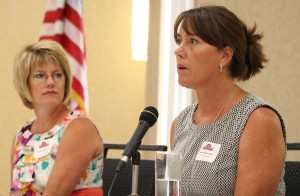Rep. Christy Perry stopped short of making predictions about the 2016 Legislature — and how her colleagues may vote on pre-K legislation.
But the Nampa Republican said she believes Idaho is closer than it has ever been to passing a bill to put state dollars into pre-kindergarten.

“The conversation has to occur,” Perry said during a Wednesday forum sponsored by the City Club of Boise.
Idaho is one of only six states that do not fund pre-K. In recent years, conservative states such as Utah and Mississippi have joined the list of states piloting pre-K programs.
In 2014 and 2015, the House Education Committee introduced bills to create a pre-K pilot system — allowing a handful of districts to launch state-funded programs, while allowing the state to gather research on the programs’ success. The bills were sponsored by Boise Democratic Rep. Hy Kloc and a handful of Republicans, including Perry. But neither bill made it out of the House committee.
The pilot bills served a purpose in starting the conversation, and generating feedback and criticism, Perry said. But Beth Oppenheimer, executive director of the Idaho Association for the Education of Young Children, pointed out that the science points to the benefits of pre-K. Early education helps children learn in elementary school — and make the social adjustment to the classroom.
“We don’t need much more research,” Oppenheimer told an audience of about 150.
Attendees included some key players in Idaho’s ongoing pre-K debate — including Lt. Gov. Brad Little; U.S. Rep. Mike Simpson; West Ada district Superintendent Linda Clark; Boise district Superintendent Don Coberly; Sen. Steven Thayn, vice chair of the Senate Education Committee; and Kloc. The audience heard a few hints about the 2016 pre-K bill.
Both Perry and Oppenheimer said the bill would be designed to encourage communities to develop their own pre-K programs. In that sense, the bill could resemble Mississippi’s model, which allows school districts, nonprofits, Head Start, day-care centers or churches to take the lead in developing a local program.
The state would provide some matching funds, but it’s unclear how much that might cost.
Perry described the program not as a cost, but an investment — which, in time, would allow the state to save money that now goes into health and welfare, prisons or college-level remediation courses. And she drew a round of applause when she challenged state policymakers to invest in an important part of the state’s infrastructure: its young children.
To Oppenheimer, a state pre-K law comes down to ensuring parental choice. Parents in some communities have a chance to choose early education. The Boise district is launching a pilot program in the city’s Vista neighborhood, while Idaho City has utilized federal timber dollars to keep a pre-K program going for 15 years. In many communities, those options don’t exist. And even Idaho’s Head Start options are lacking; only 20 percent of eligible children enroll in this federal program.
Idaho lawmakers have resisted pre-K bills for years. That tide might be turning — during a conference in Boise in May, Thayn predicted that a pre-K bill could pass in 2016. But the Emmett Republican, among others, has questioned whether the state has a role in early education.
The debate involves money — like most debates at the Statehouse — but it isn’t just about money.
The state ended its 2014-15 budget year with a $108 million surplus, and could easily put some money into a down payment on pre-K, said Perry. The bigger obstacles could involve getting legislators to look past their own personal experiences in parenting, and in changing the culture about early education.
“(It) really takes a paradigm shift,” she said.
Disclosure: Kevin Richert serves on the City Club’s board of directors, and helped organize Wednesday’s forum.
